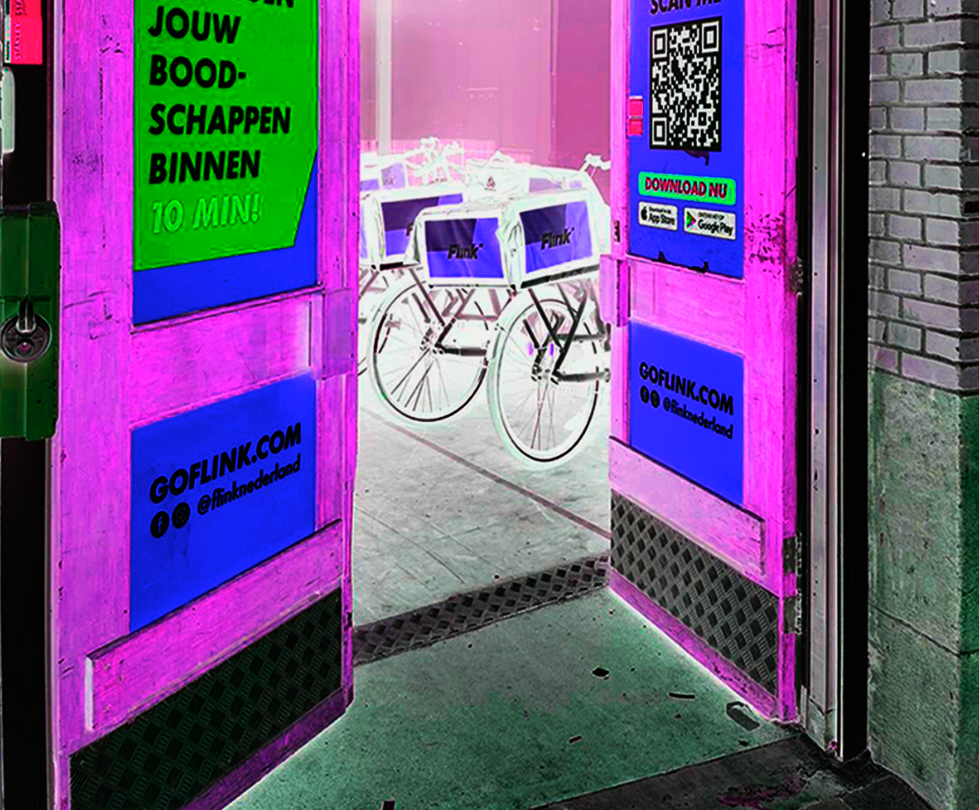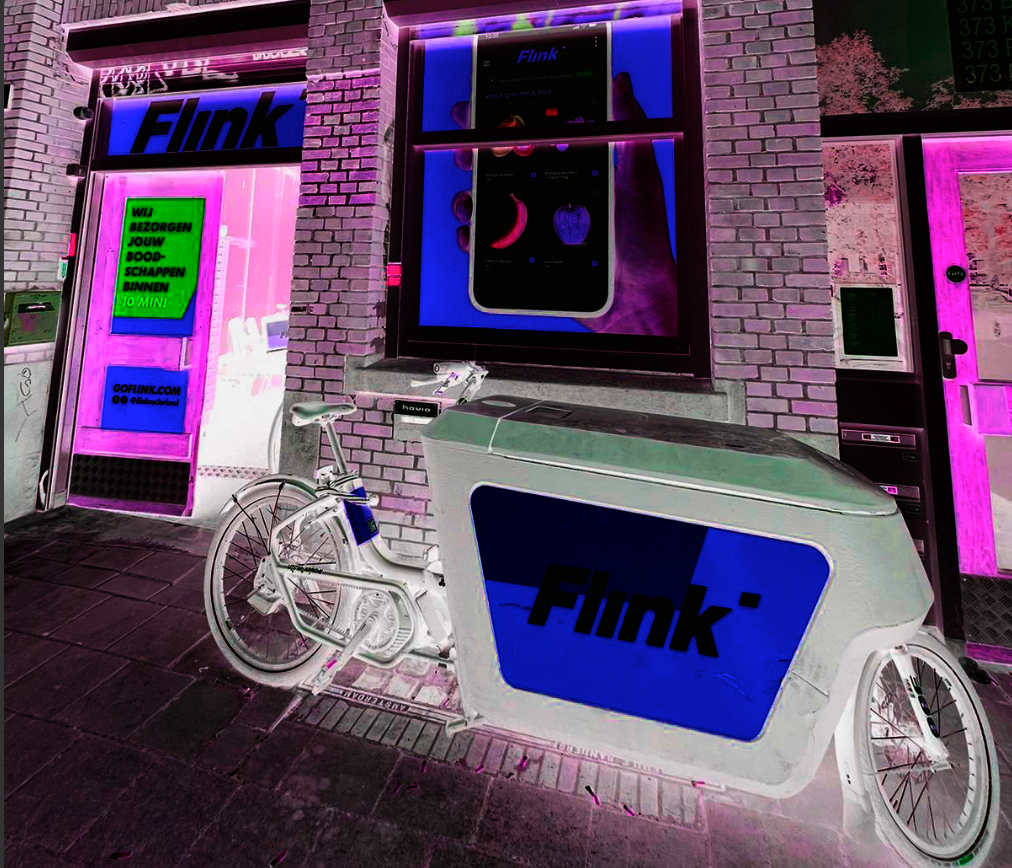Originally published in Dutch on NRC (May 22th, 2022)
Premise of the article
This article looks at Amsterdam as an illustrative example of our research about digital platforms. Commercial platforms for food and grocery delivery have grown tremendously during the Covid period. Their advertisements and logos are capturing attention everywhere, on ferries, trams and in the most mundane spots in the city. Their service can be faster than trams and their bicycles are riding in the city at full speed. Dark shops, their warehouse located in the logistically strategic points in the city, are taking over empty stores. Cargo bikes/bakfiets are waiting outside of dark shops, and sidewalks are congested within neighbourhoods. The promise for the consumer is to receive the grocery in 10 minutes. How can we make sense of these new commercial platforms that offer a techno-innovative service? What is the cost in our city, in terms of values, public space use and mobility?

Interior of a Flink darkstore in Amsterdam
Techno-innovative services and commercial digital platforms are considered a ‘win-win’ business model. The bike delivery grocery service is not exceptional. Their cargo bikes are sustainable and the temptation to order food from the couch after a long day of work is part of the imaginary which gravitates around “sharing and gig economy”. Digital platforms are making our time more efficient. What’s wrong then with technology bringing us a convenient choice? What is untold behind the ‘win-win’ condition? Who are the few winners among the bigger picture of stakeholders? And who are the losers? This article will zoom out to trace the contours of this new phenomenon and sketch out a bigger picture. The city of Amsterdam is an illustrative example due to its compactness and mobility arrangements. Besides, the prominence of these services invites us to rethink essential values, such as social cohesion, solidarity, and collective use of public spaces. These so-called techno-innovative services and their slogan are replacing important values to maintain a certain type of urban fabric.
The bicycle was a large part of the counterculture revolution in the 1970s in Amsterdam and later spread to the whole Netherlands. Yoko Ono & John Lennon were even in bed with a bicycle in the Hilton in 1969. It was not only because the bicycle would solve congestion and finally bring us faster to work, but from a cultural and symbolic meaning the bicycle represented a radically different way of living A counterweight against the ‘brutal capitalism’ forces which were cars and the fast mobility plan in which protests started. ‘De fiets is iets en bijna niets’. This also linked to the first idea of bike-sharing: actually SHARING white bicycles. A caring, empathy-based lifestyle where streets could return to being a public space for society to thrive.
If our pride in everyday bicycle-based mobility culture represents the value of how public space is used, these new commercial entities and their bicycles are disrupting both the market and the function of public spaces. Hence, they appear as a Trojan horse from which technocratic and brutal capitalist forces are coming out in the forms of sustainable means of transportation. However, what is at stake is the equalitarian mobility values and the importance of keeping the public space accessible for the whole societal needs.

Facade of a Flink darkstore in Amsterdam
Despite media coverage on the nuisances that darkstores made negative impacts to the neighbourhood, labour conditions of delivery works and other regulations these companies step on the border of violation. The announcement of a business partnership between Jumbo-Visma and Gorillas raised the (red) flag to announce that the corrupt mechanisms that we refused by choosing bikes over cars as alternatives, is coming back in the shape of technology on bikes. The partnership between racing bike teams, mega-retailer cooperation and platform delivery service symbolizes the value of the business model is focused on competitive speed and retail price to offer a convenient online shopping environment carried by sustainable mobility.
As urban mobility, public space, and digital platforms researchers, we think it’s important to point out these in different values that attempt to ‘share’ our bike lanes and public spaces. First, the speed dominant logistic value on racing bike delivery is significantly threatening the equalitarian bike culture of the Netherlands: it should represent everyone, old and young, and it must remain safe to bike on the shared bike lanes. The difference in speed not only threatens mobility safety but also elevates the existing tensions between ‘gewone fietsers’ and racing cyclists, which the latter is already a concern of the national road authority ANWB.
Second, whether grocery products come from darkstores or supermarket warehouses, the fact that this shopping culture is meant for young highly educated people and not for a vulnerable segment of the society. As a result, social inequality might be exacerbated and the mobility in the city can be even more uneven. Those who can afford being lazy on the couch and those who risk their life and public safety to deliver the goods under highly problematic labour conditions…
Last, we disagree that the future of urban retail culture should be replaced by the asocial, efficiency dominated techno-innovative services. Shopping and grocery in the neighbourhood mean much more than purchase and delivery. It creates everyday micro-social interactions citizens share on sidewalks, during shopping, small talks with strangers in public spaces, which are what make our city safe and lively. The municipality has the responsibility to secure urban streets and public spaces to make citizens feel safe to use these spaces.
Sharing is caring, not exploiting. We urge the governments to think carefully about what kind of tech environment they give incentives to and what consequences it might have on our urban public spaces. As digitalization has become part of mundane life, we should be more critical of what technology can bring to our society, and what values humans can not give away to digital services. In this case, we citizens should not give away the illusional convenient service that ‘techno-innovative’ promised to make through bikes.

